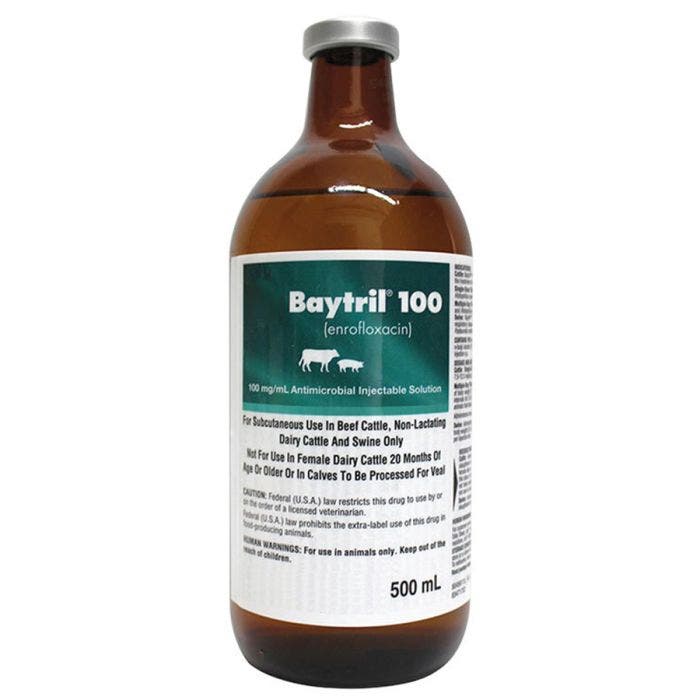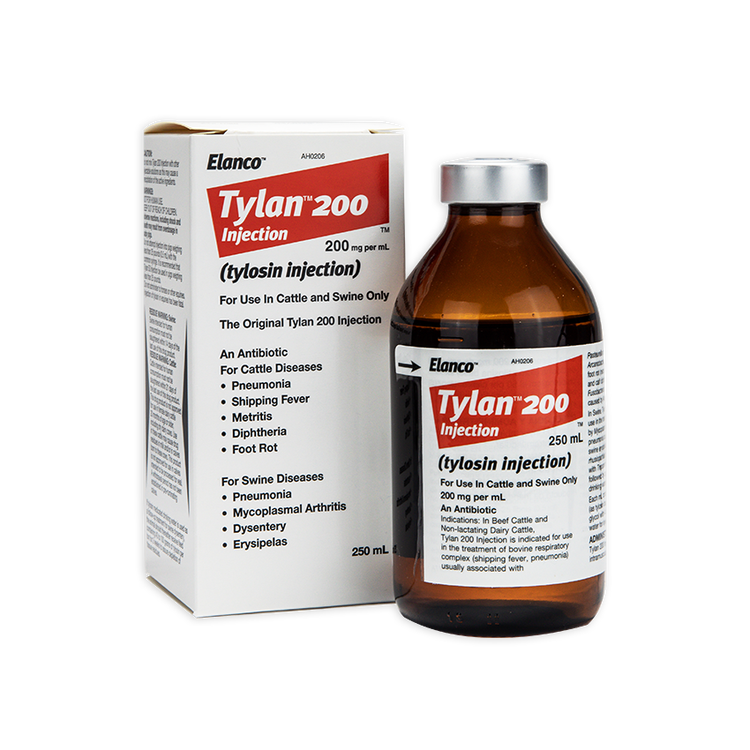Intestinal Integrity
Enteric diseases account for multi-million dollar annual economic losses.1
Get Full Value from start to finish
Supporting normal enteric function and preventing and controlling enteric diseases are critical to maintain production efficiency and produce wholesome pork.1 Elanco offers vaccine, feed and water-soluble solutions for all production phases.

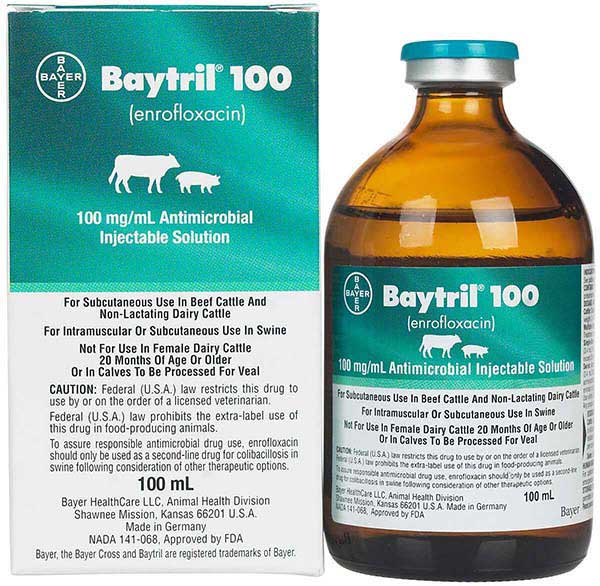
Baytril® 100 - 100 mL
Respiratory disease occurrence and severity is affected by factors such as weaning, handling, temperature and ventilation. Baytril® 100 helps manage SRD and E. coli challenges that can be exacerbated by environmental stressors allowing producers to optimize full value from start to finish.
Baytril® 100 - 250 mL
Respiratory disease occurrence and severity are affected by factors such as weaning, handling, temperature and ventilation. Baytril® 100 helps manage SRD and E. coli challenges that can be exacerbated by environmental stressors allowing producers to optimize full value from start to finish.
Baytril® 100 - 500 mL
Respiratory disease occurrence and severity are affected by factors such as weaning, handling, temperature and ventilation. Baytril® 100 helps manage SRD and E. coli challenges that can be exacerbated by environmental stressors allowing producers to optimize full value from start to finish.

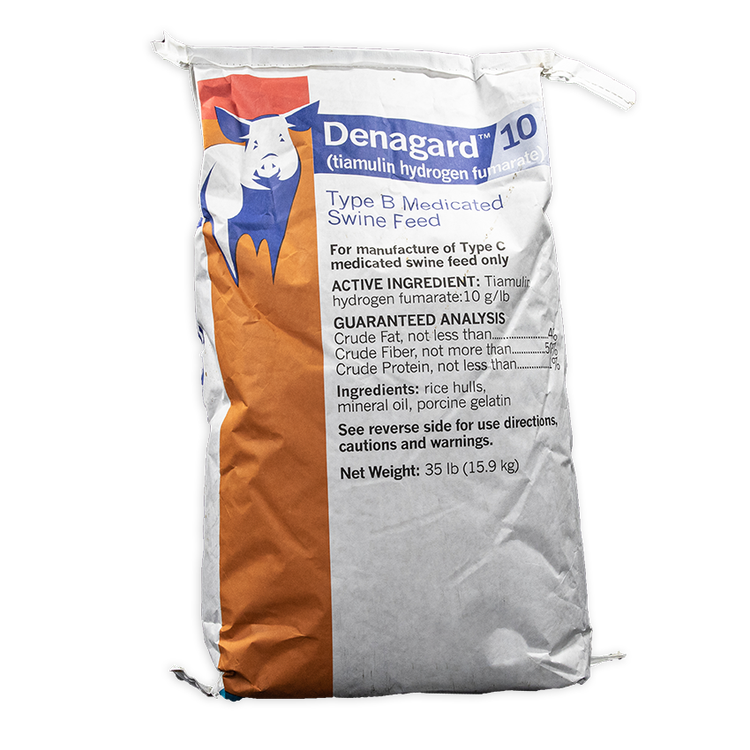
Denagard® 10 Premix
Denagard® 10 Premix effectively controls SD associated with Brachyspira hyodysenteriae, a highly contagious, difficult to control and slow immunity generating disease and ileitis associated with Lawsonia intracellularis, a leading enteric disease in the U.S.

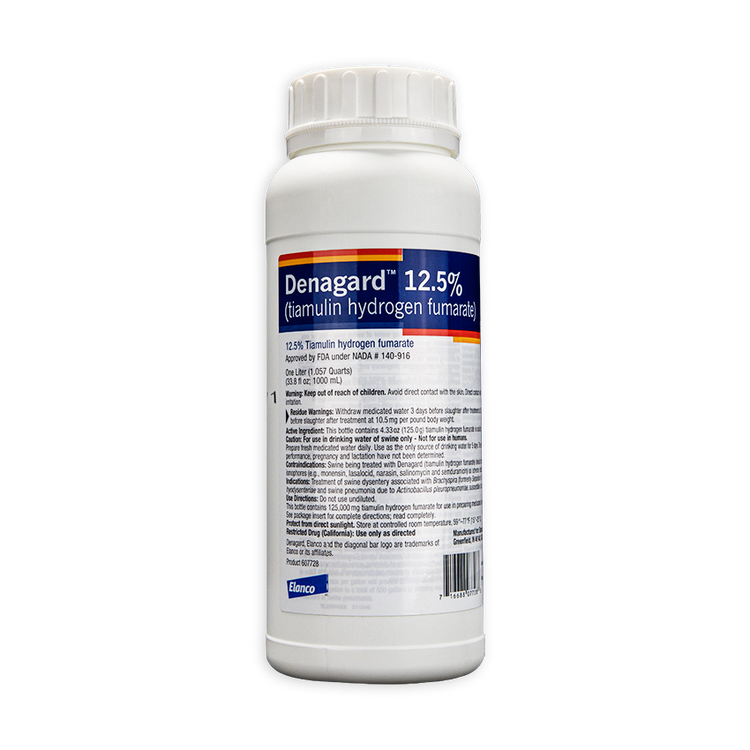
Denagard® LC- 1L
Denagard® LC treats swine pneumonia caused by Actinobacillus pleuropneumoniae (APP), a highly contagious disease often characterized by sudden onset, short clinical course, high morbidity and high mortality.

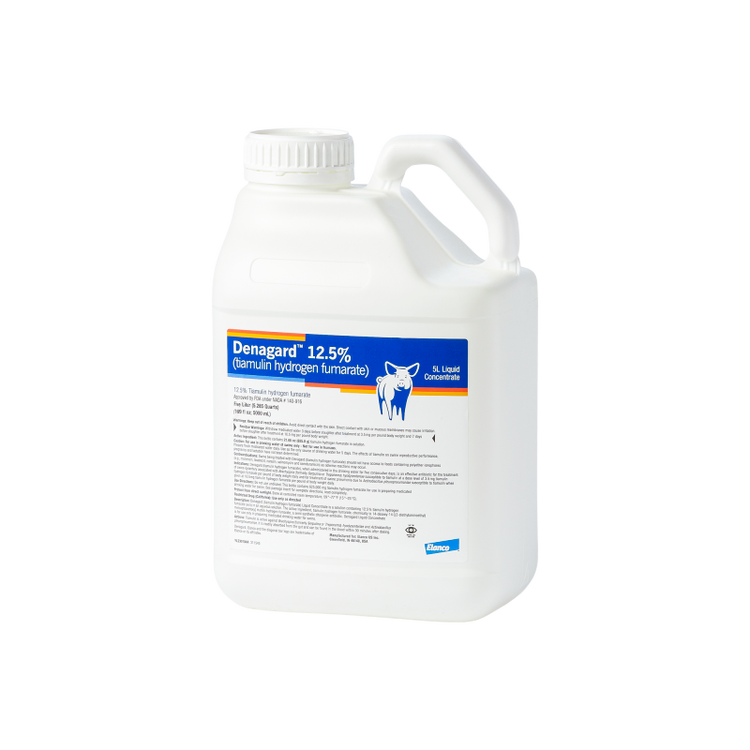
Denagard® LC- 5L
Denagard® LC treats swine pneumonia caused by Actinobacillus pleuropneumoniae (APP), a highly contagious disease often characterized by sudden onset, short clinical course, high morbidity and high mortality.

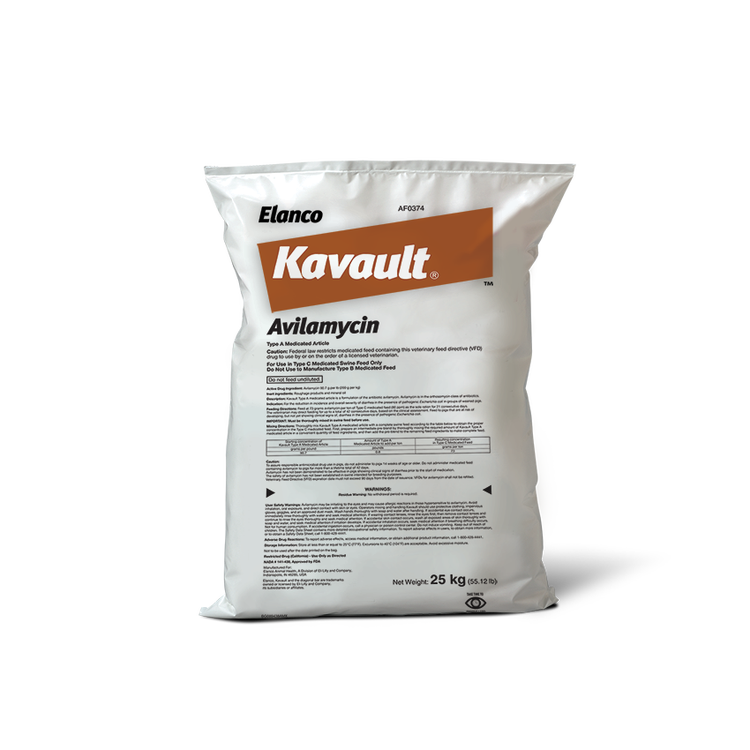
Kavault®
Post weaning, incomplete immune systems leave young pigs vulnerable. Diarrhea is a typical sign of disease challenge in the nursery phase. One of the most important causes of PWD in pigs, pathogenic E. coli-induced diarrhea, ranks among the most common diseases overall in global swine production.

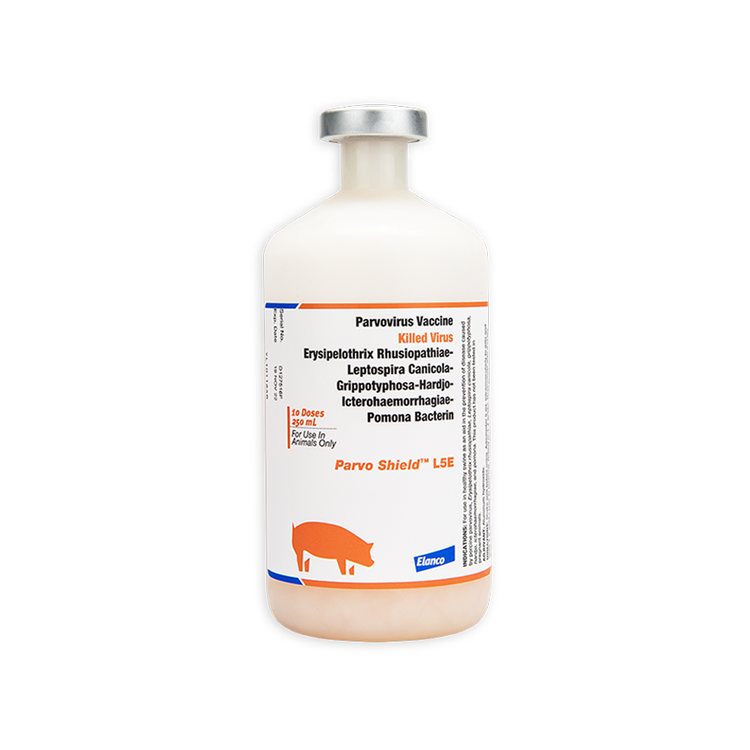
Parvo Shield® - 10 dose
Consistent conception and farrowing rates for large litters can be impacted by disease challenges in prebreeding. Parvo Shield® L5E provides protection against parvovirus, five leptospirosis strains, and erysipelas to protect against reproductive loss.

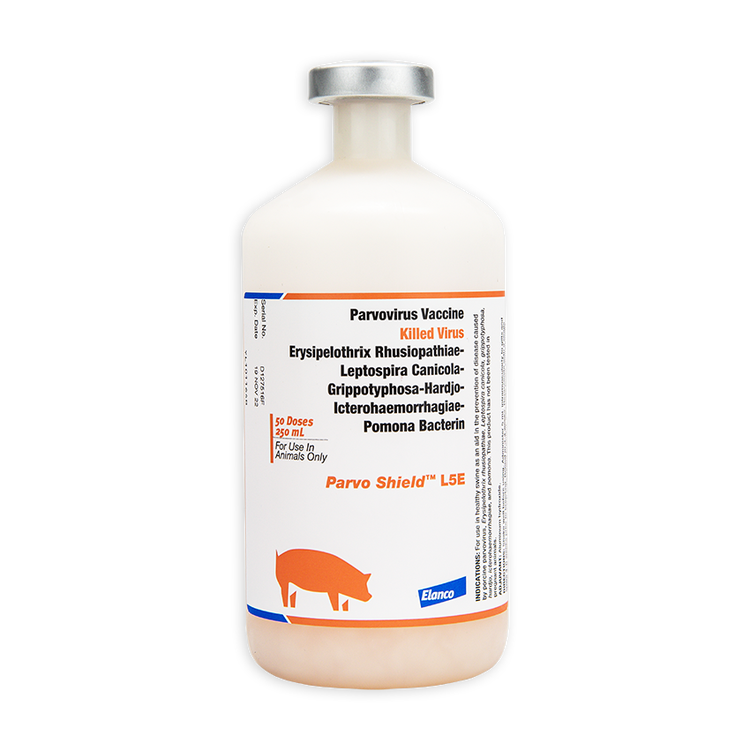
Parvo Shield® - 50 dose
Consistent conception and farrowing rates for large litters can be impacted by disease challenges in prebreeding. Parvo Shield® L5E provides protection against parvovirus, five leptospirosis strains, and erysipelas to protect against reproductive loss.

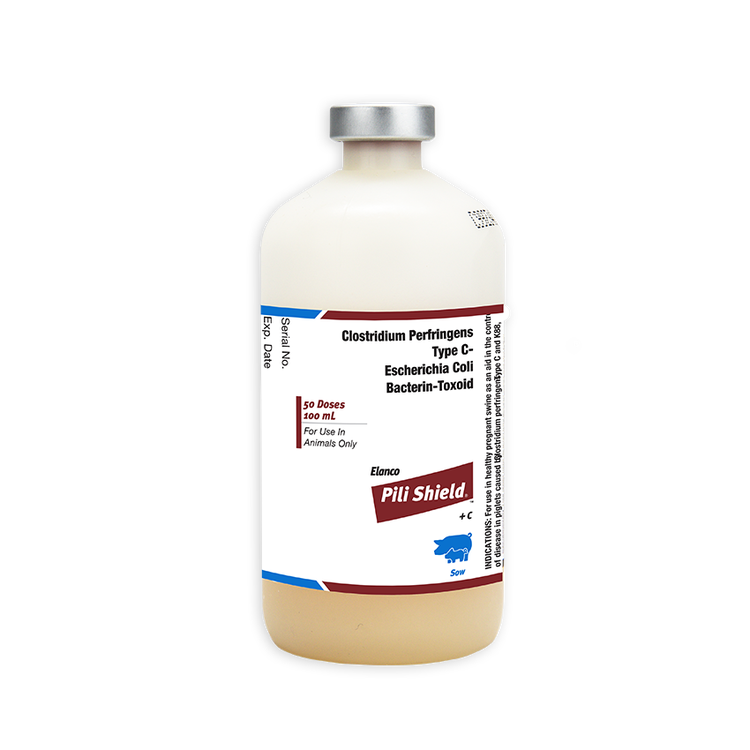
Pili Shield® - 50 dose
E. coli possesses fimbriae, or pili, that allow them to adhere and colonize in digestive tracts, often resulting in diarrhea, dehydration and acidosis in young and nursing pigs. Protecting piglets with Pili Shield® at birth through passed maternal antibodies prevents attachment of E. coli to gut walls.
Tylan® (tylosin injection) 50 Injection - 100 mL
Tylan® Injection is a cost-effective multi-control solution trusted for more than 30 years.
Tylan® (tylosin injection) 200 Injection
Tylan® Injection is a cost-effective multi-control solution trusted for more than 30 years.
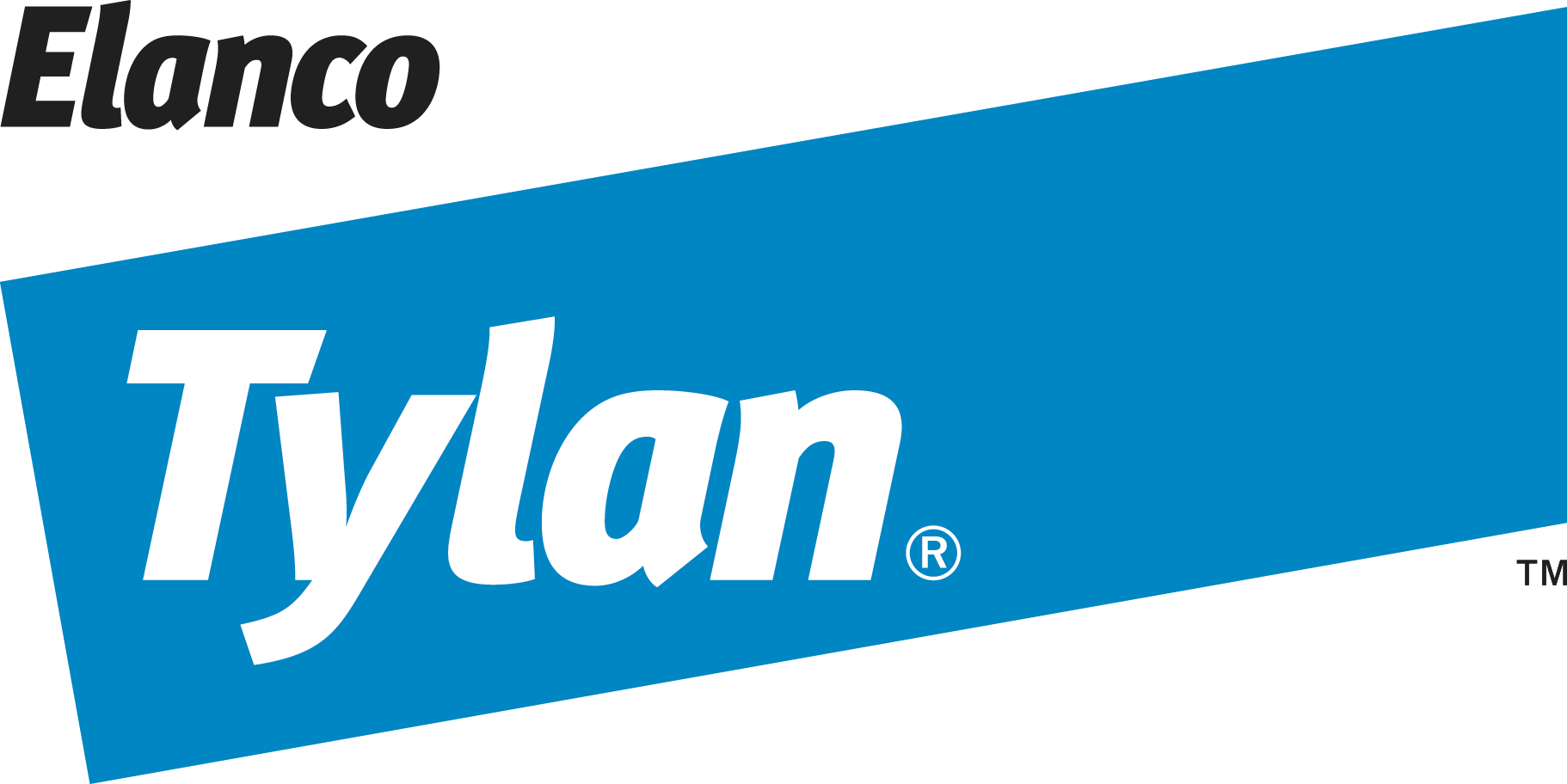
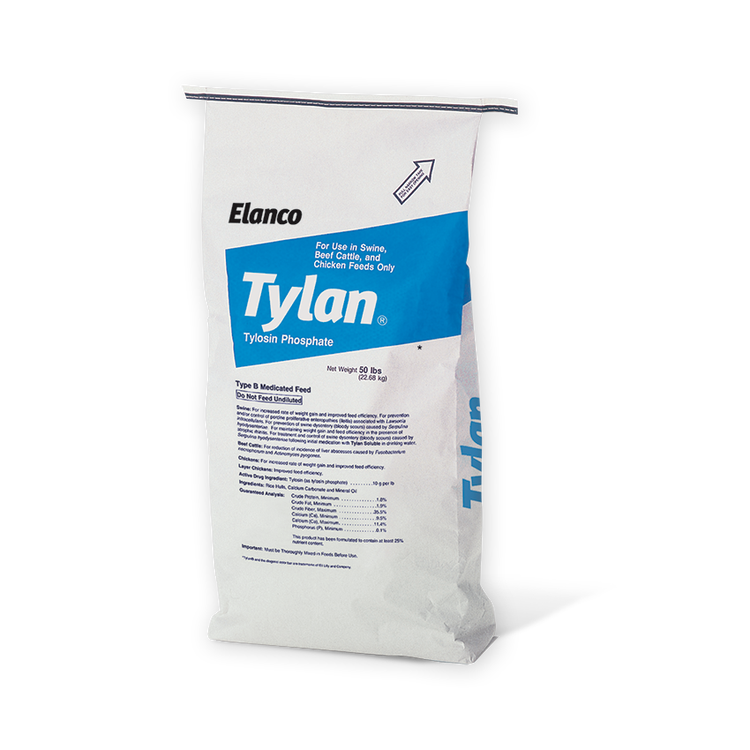
Tylan® 40 Premix
Tylan® has consistent, dependable results in-feed to control ileitis, delivering a healthy gut to grow a healthy pig.

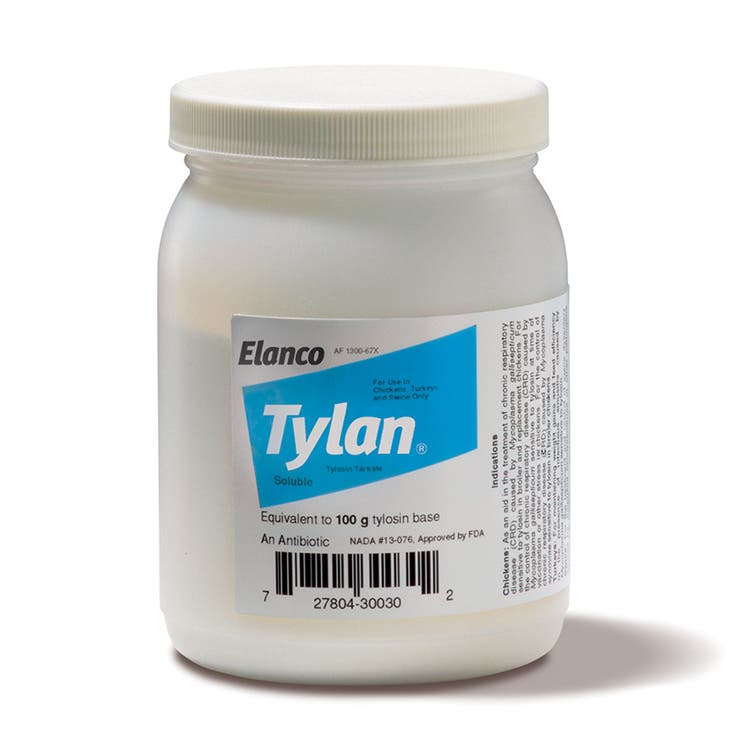
Tylan® Soluble
Tylan® Soluble effectively controls ileitis, a leading enteric disease in the U.S., by accumulating in the cells of the swine intestinal lining where the infection occurs.
The label contains complete use information, including cautions and warnings. Always read, follow and understand the label and use directions.
Baytril®
INDICATIONS:
- For the treatment and control of swine respiratory disease (SRD) associated with Actinobacillus pleuropneumoniae, Pasteurella multocida, Haemophilus parasuis, Streptococcus suis, Bordetella bronchiseptica, Mycoplasma hyopneumoniae.
- For the control of colibacillosis in groups or pens of weaned pigs where colibacillosis associated with Escherichia coli has been diagnosed.
DOSAGE AND ADMINISTRATION:
- Administer, either by intramuscular or subcutaneous (behind the ear) injection, a single dose of 7.5 mg/kg of body weight (3.4 mL/100lb). Administered dose volume should not exceed 5 mL per injection site.
- For the control of colibacillosis, administration should be initiated within the first 60 days post-weaning when clinical signs are present in at least 2% of the animals in the group. If no improvement is noted within 48 hours, the diagnosis should be reevaluated.
IMPORTANT SAFETY INFORMATION:
CAUTION: Federal (U.S.A.) law restricts this drug to use by or on the order of a licensed veterinarian. Federal (U.S.A.) law prohibits the extra-label use of this drug in food-producing animals. To assure responsible antimicrobial drug use, enrofloxacin should only be used as a second-line drug for colibacillosis in swine following consideration of other therapeutic options.
- Not for use in humans. Keep out of reach of children.
- Avoid contact with eyes. In case of contact, immediately flush eyes with copious amounts of water for 15 minutes.
- In case of dermal contact, wash skin with soap and water. Consult a physician if irritation persists following ocular or dermal exposures.
- Individuals with a history of hypersensitivity to quinolones should avoid this product. In humans, there is a risk of user photosensitization within a few hours after excessive exposure to quinolones. If excessive accidental exposure occurs, avoid direct sunlight.
Denagard® Premix
INDICATIONS:
- For control of swine dysentery associated with Brachyspira hyodysenteriae susceptible to Tiamulin.
- For treatment of swine dysentery associated with Brachyspira hyodysenteriae susceptible to Tiamulin.
- For control of porcine proliferative enteropathies (ileitis) associated with Lawsonia intracellularis susceptible to Tiamulin.
- + CTC: For control of swine dysentery associated with Brachyspira hyodysenteriae susceptible to Tiamulin and for treatment of swine bacterial enteritis caused by Escherichia coli and Salmonella choleraesuis sensitive to chlortetracycline and treatment of bacterial pneumonia caused by Pasteurella multocida sensitive to chlortetracycline.
DIRECTIONS FOR USE
For treatment of swine dysentery associated with Brachyspira hyodysenteriae susceptible to Tiamulin:
- Feed 200 g/ton for 14-days for treatment (7-day withdrawal).
For control of porcine proliferative enteropathies (ileitis) associated with Lawsonia intracellularis:
- Feed 35 g/ton for not less than 10 days (2-day withdrawal).
For control of swine dysentery associated with Brachyspira hyodysenteriae susceptible to Tiamulin:
- Feed 35 g/ton continuously as sole ration (2-day withdrawal).
Feeding Denagard alone does not require a Veterinary Feed Directive (VFD). Feeding Denagard + CTC does require a VFD.
- Feed 35 g/ton of Denagard + 400 g/ton (10 mg/lb body weight in daily divided doses) CTC for 14 days.
CAUTION: Federal law restricts medicated feed containing this veterinary feed directive (VFD) drug to use by or on the order of a licensed veterinarian.
IMPORTANT SAFETY INFORMATION
- Keep out of reach of children.
- Avoid contact with skin. Direct contact with skin or mucous membranes may cause irritation.
- The effects of Tiamulin on swine reproductive performance, pregnancy and lactation have not been determined.
- Swine being treated with Denagard (Tiamulin) should not have access to feeds containing polyether ionophores (e.g., lasalocid, monensin, narasin, salinomycin and semduramicin) as adverse reactions may occur. If signs of toxicity occur, discontinue use.
Denagard® LC
INDICATIONS:
- Treatment of swine dysentery associated with Brachyspira hyodysenteriae and swine pneumonia due to Actinobacillus pleuropneumoniae, susceptible to Tiamulin.
DIRECTIONS FOR USE:
- For treatment of swine dysentery, utilize Denagard LC in drinking water at 3.5 mg/lb for five consecutive days.
- For treatment of swine pneumonia, utilize Denagard LC in drinking water at 10.5 mg/lb for five consecutive days.
IMPORTANT SAFETY INFORMATION:
- Keep out of reach of children.
- Avoid direct contact with the skin. Direct contact with skin or mucous membranes may cause irritation.
- Withdraw medicated water 3 days before slaughter after treatment at 3.5 mg/lb and 7 days before slaughter following treatment at 10.5 mg/lb.
CAUTION: For use in drinking water of swine only - Not for use in humans.
- Prepare fresh medicated water daily. Use as the only source of drinking water for 5 days.
- The effects of Tiamulin on swine reproductive performance, pregnancy and lactation have not been determined.
- Swine being treated with Denagard (Tiamulin hydrogen fumarate) should not have access to feeds containing polyether ionophores (e.g. lasalocid, monensin, narasin, salinomycin and semduramicin) as adverse reactions may occur.
Kavault®
INDICATION:
- For the reduction in incidence and overall severity of diarrhea in the presence of pathogenic Escherichia coli in groups of weaned pigs.
DIRECTIONS FOR USE:
- Feed at 73 grams avilamycin per ton of Type C medicated feed (80 ppm) as the sole ration for 21 consecutive days.
- The veterinarian may direct feeding for up to a total of 42 consecutive days, based on clinical assessment.
- Feed to pigs that are at risk of developing, but not yet showing signs of, diarrhea in the presence of pathogenic Escherichia coli.
IMPORTANT SAFETY INFORMATION:
- CAUTION: Federal law restricts medicated feed containing this veterinary feed directive drug to use by or on the order of a licensed veterinarian.
- No withdrawal period required when fed according to the label.
- To assure responsible antimicrobial drug use in pigs, do not administer to pigs 14 weeks of age or older or for more than a lifetime total of 42 days.
- VFD expiration date must not exceed 90 days from the date of issuance. VFDs for avilamycin shall not be refilled.
- Avilamycin has not been demonstrated to be effective in pigs showing clinical signs of diarrhea prior to the start of medication.
- Avoid inhalation, oral exposure, and direct contact with skin or eyes.
Parvo Shield®
INDICATIONS:
- This product has been shown to be effective for the vaccination of healthy swine against disease caused by porcine parvovirus, Erysipelthrix rhusiopathiae, and Leptospira canicola, grippotyphosa, hardjo, icterohaemorrhagiae, and pomona.
- This product was licensed prior to the requirement to establish a minimum age for use.
- The duration of immunity for this product has not been established. For more information regarding efficacy and safety data, see productdata.aphis.usda.gov.
DIRECTIONS FOR USE:
- Shake well before using.
- Administer 5 mL intramuscularly to gilts and sows 4 to 6 weeks prior to breeding.
- Repeat in 3 to 4 weeks.
- Revaccinate with a single dose 4 to 6 weeks prior to each subsequent breeding.
- Vaccinate boars semiannually.
IMPORTANT SAFETY INFORMATION
PRECAUTIONS:
- Store out of direct sunlight at 2° to 8° C (35° to 46°F).
- DO NOT FREEZE.
- Do not mix with other products except as specified on this label.
- Use entire contents when first opened. Do not vaccinate within 21 days prior to slaughter.
- This product has not been tested on pregnant animals.
- In case of human exposure, contact a physician. Anaphylactic reactions may occur. Symptomatic treatment: Epinephrine. Contains amphotericin B, gentamicin, and thimerosal as preservatives.
Pili Shield®
INDICATIONS:
- This product has been shown to be effective for the vaccination of healthy pregnant swine to provide passive immunity in piglets against disease caused by Clostridium perfringens Type C and K88, K99, 987P, and F41 piliated Escherichia coli. The duration of immunity for these antigens has not been established. For more information go to productdata.aphis.usda.gov.
DIRECTIONS:
- Shake well before using.
- Administer 2 mL intramuscularly at 5 and 2 weeks prior to farrowing. It is essential that newborn pigs receive colostrum from the vaccinated dam.
- Revaccinate prior to each subsequent farrowing.
IMPORTANT SAFETY INFORMATION
PRECAUTIONS:
- Store out of direct sunlight at 2° to 8° C (35° to 46° F).
- DO NOT FREEZE.
- Do not mix with other products, except as specified on this label. Use entire contents when first opened. In case of human exposure, contact a physician.
- Do not vaccinate within 21 days prior to slaughter.
- Anaphylactic reactions may occur. Symptomatic treatment: Epinephrine.
Tylan® Injection:
INDICATIONS:
- For the treatment of swine arthritis caused by Mycoplasma hyosynoviae; swine pneumonia caused by Pasteurella spp.; swine erysipelas caused by Erysipelothrix rhusiopathiae; swine dysentery associated with Treponema hyodysenteriae when followed by the appropriate medication in the drinking water and/or feed.
ADMINISTRATION AND DOSAGE:
- Inject intramuscularly 4 mg per pound of body weight (1 mL per 50 pounds) twice daily. Treatment should be continued 24 hours following remission of disease signs, not to exceed 3 days. Do not inject more than 5 mL per site.
IMPORTANT SAFETY INFORMATION:
CAUTION: Federal law restricts this drug to use by or on the order of a licensed veterinarian.
WARNING: NOT FOR HUMAN USE. KEEP OUT OF REACH OF CHILDREN.
- Adverse reactions, including shock and death may result from overdosage in baby pigs. Do not attempt injection into pigs weighing less than 25 pounds (0.5 mL) with the common syringe. It is recommended that Tylan 50 Injection be used in pigs weighing less than 25 pounds.
- Do not administer to horses or other equines. Injection of tylosin in equines has been fatal.
- Swine intended for human consumption must not be slaughtered within 14 days of the last use of this drug product.
- If tylosin medicated drinking water is used as a follow-up treatment for swine dysentery, the animal should thereafter receive feed containing 40 to 100 grams of tylosin per ton for 2 weeks to assure depletion of tissue residues.
Tylan® Premix
INDICATIONS
- For reduction in severity of effects of atrophic rhinitis.
- For control of swine dysentery associated with Brachyspira hyodysenteriae.
- For the treatment and control of swine dysentery associated with Brachyspira hyodysenteriae immediately after medicating with Tylan Soluble (tylosin) drinking water.
- For control of porcine proliferative enteropathies (PPE, ileitis) associated with Lawsonia intracellularis.
- For treatment and control of porcine proliferative enteropathies (PPE, ileitis) associated with Lawsonia intracellularis immediately after medicating with Tylan Soluble (tylosin) in drinking water.
DIRECTIONS FOR USE
- For reduction in severity of effects of atrophic rhinitis:
- Feed 100 g of tylosin per ton (1.0 pound Tylan 100 per ton) of complete feed. Feed continuously as the sole ration.
- For control of swine dysentery:
- Feed 100 g of tylosin per ton (1.0 pound Tylan 100 per ton) of complete feed for at least three weeks. Follow with 40 g tylosin per ton (0.4 pound Tylan 100 per ton) of complete feed until pigs reach market weight.
- For the treatment and control of swine dysentery:
- Feed 40 to 100 grams of tylosin (0.4 to 1.0 pounds of Tylan 100) per ton of complete feed for 2 to 6 weeks immediately after medicating with 250 mg tylosin (as Tylan Soluble) per gallon in drinking water for 3 to 10 days.
- For control of porcine proliferative enteropathies (PPE, ileitis):
- Feed 100 g of tylosin per ton (1.0 pound Tylan 100 per ton) of complete feed for 21 days. Alternatively, feed 100 g of tylosin per ton (1.0 pound Tylan 100 per ton) of complete feed for at least three weeks, followed by 40 g tylosin per ton of complete feed until pigs reach market weight. Alternatively, feed 40 to 100 grams of tylosin (0.4 to 1.0 pounds of Tylan 100) per ton of complete feed for 2 to 6 weeks immediately after medicating with 250 mg tylosin (as Tylan Soluble) per gallon in drinking water for 3 to 10 days. Feed continuously as the sole ration when feeding Tylan.
CAUTION: Federal law restricts medicated feed containing this veterinary feed directive (VFD) drug to use by or on the order of a licensed veterinarian.
IMPORTANT SAFETY INFORMATION:
- NOT FOR HUMAN USE
- Store at Room Temperature, 25 C (77 F). Avoid moisture.
- Not to be used after the date printed on the bottom of the bag.
- To ensure adequate mixing, an intermediate blending step should be used prior to manufacturing a complete feed. Do not use liquid feed containing sodium metabisulfite or in any finished feed (supplement, concentrate or complete feed) containing excess 2% bentonite.
WARNING:
- Tylan 100 may be irritating to unprotected skin and eyes. When mixing and handling Tylan 100 use protective clothing, impervious gloves and a dust respirator.
- In case of accidental eye exposure, flush eyes with plenty of water. Exposed skin should be washed with plenty of soap and water. Remove and wash contaminated clothing.
- Seek medical attention if irritation becomes severe or persists.
Tylan® Soluble
INDICATIONS
- For the treatment and control of swine dysentery (SD) associated with Brachyspira hyodysenteriae.
- For the treatment and control of SD associated with Brachyspira hyodysenteriae when followed immediately by Tylan Type A medicated article in feed.
- For the control of porcine proliferative enteropathies (PPE, ileitis) associated with Lawsonia intracellularis when followed by Tylan Type A medicated article in feed.
DOSAGE AND ADMINISTRATION
- Dosage for swine: 250 mg/gallon (66 ppm) in drinking water.
- Always add the water to the powder. Do not pour the powder into the water. Prepare a fresh Tylan Soluble solution every three days. When mixing and handling tylosin, use protective clothing and impervious gloves.
- For swine dysentery, administer medicated drinking water for 3 to 10 days, depending upon severity of infection. Alternatively, administer medicated drinking water for 3 to 10 days, followed by 40 to 100 g tylosin per ton of complete feed (Type C medicated feed manufactured from Tylan Type A medicated article) for 2 to 6 weeks.
- For PPE, administer medicated drinking water for 3 to 10 days, followed by 40 to 100 g of tylosin per ton of complete feed (Type C medicated feed manufactured from Tylan A medicated article) for 2 to 6 weeks.
- Only medicated water should be available to swine while medicating with Tylan Soluble.
IMPORTANT SAFETY INFORMATION
CAUTION: Federal (USA) law restricts this drug to use by or on the order of a licensed veterinarian.
- Not for human use. Keep out of reach of children. Avoid contact with skin. Exposure to tylosin may cause a rash.
- Swine must not be slaughtered for food within 48 hours after treatment.
Denagard, Kavault, Parvo Shield, Pili Shield, Tylan, Elanco and the diagonal bar logo are trademarks of Elanco or its affiliates. Baytril is sold by Elanco or its affiliates and is not a product of Bayer. Baytril is a trademark owned by Bayer and used under license.
©2023 Elanco or its affiliates. PM-US-23-0483

